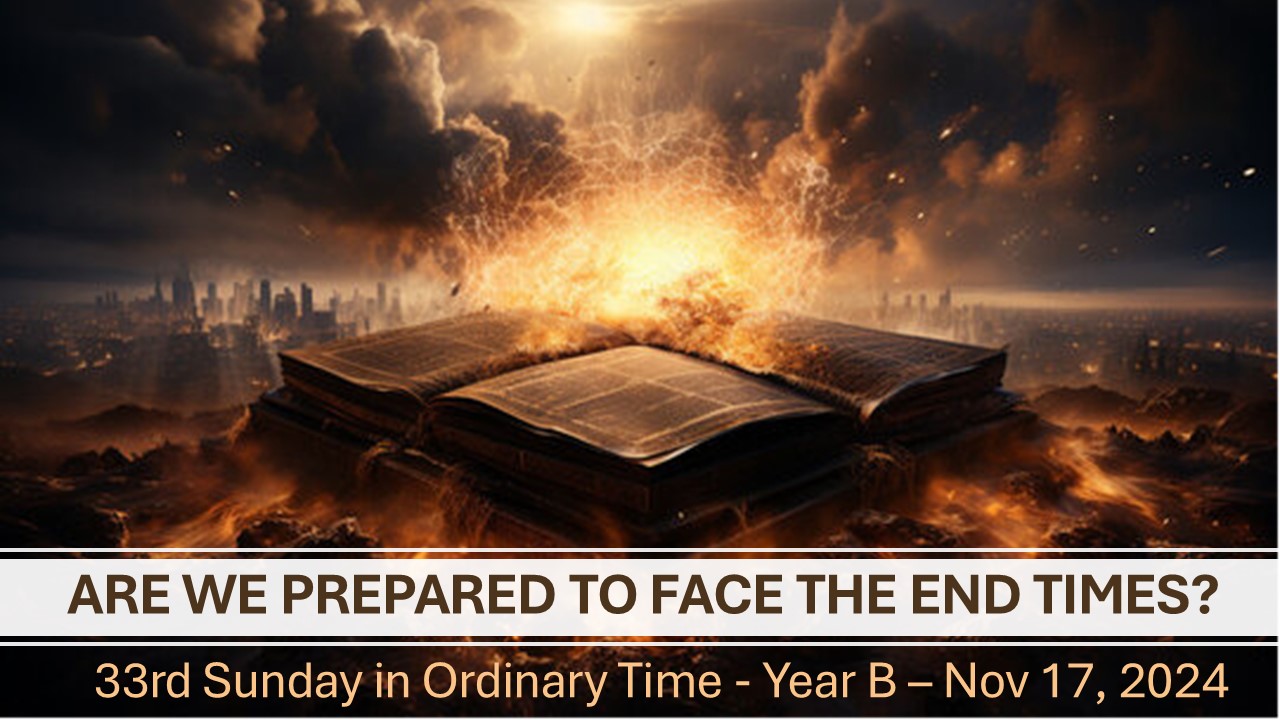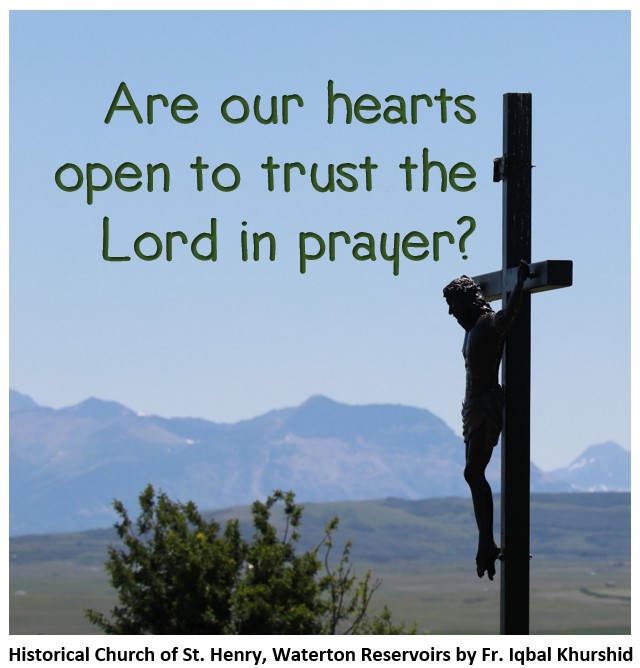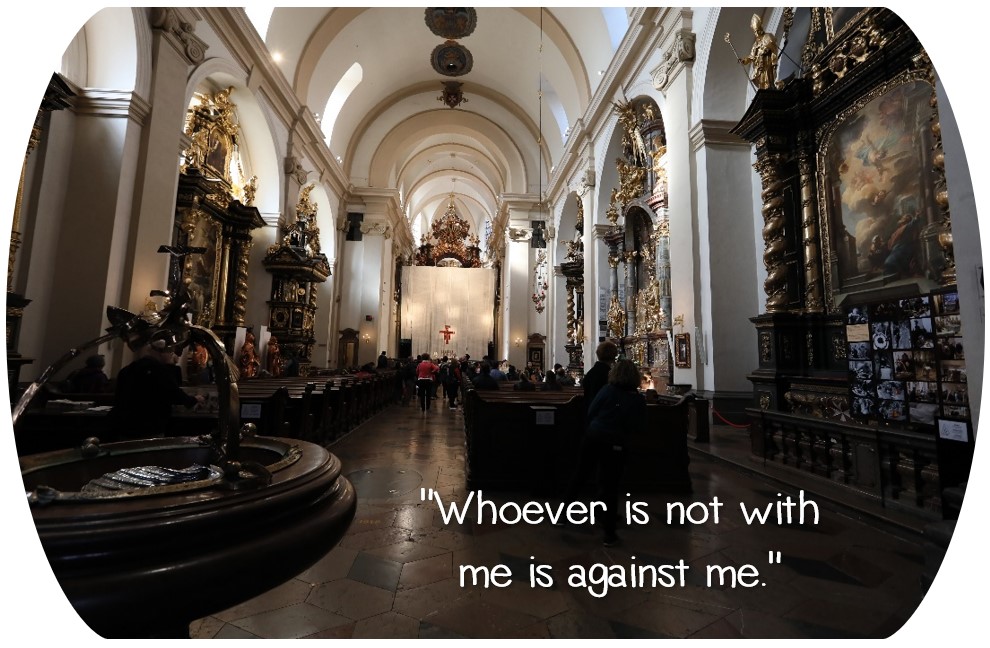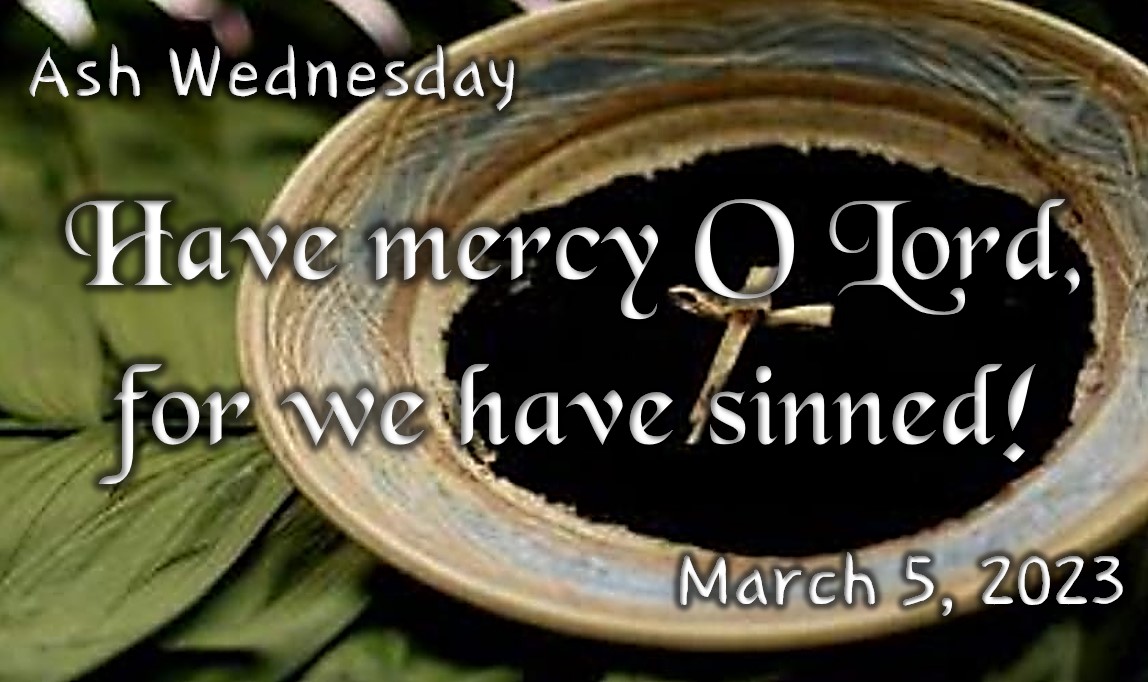
33rd SUNDAY IN ORDINARY TIME YEAR B ~ November 17, 2024
FACING THE END TIMES
We are almost coming to the end of the liturgical calendar Year B and next Sunday we will be celebrating the Solemnity of Christ the King. The environment of the world has changed from 2023 after the attack on Isreal which has led to chaos, tribulations, disunity, and hatred among the people. In their emotions, people have failed to stand for wrong or right because the anger have taken over everything. Is there any time that people will experience peace, harmony and unity? I can go on to speak more about the situation of the world now but let us focus more on hope and peace rather than getting scared from the current situation.
A man went to a monastery for a silent retreat. After he finished, he felt better, calmer, stronger, but something was missing. The teacher said he could talk to one of the monks before he left.
The man thought for a while, then asked: “How do you find peace?”
The monk said: “I say yes. To everything that happens, I say yes.”
When the man returned home, he was enlightened.
The Readings of this week not only speak about the end time (Eschatology) and they do offer us a moment to reflect on the protection the Lord God provides. Although end time narratives always scare people and thus no one wants to talk to about them. We want to live in a peaceful world and don’t want to hear anything about violence, war, hatred, division, killing and destruction but reality is very bitter and maybe sometimes more than what we can think. However, when we hear about the end times through the Bible, it is not to scare us but to prepare us for the final destination, that is eternal life or heaven. God loves us and he wants to protect us though sometimes that protection may not be visible.
During World War II, a US Marine was separated from his unit on a Pacific Island. The fighting had been intense, and in the smoke and the crossfire, he had lost touch with his comrades. Alone in the jungle, he could hear enemy soldiers coming in his direction. Scrambling for cover, he found his way up a high ridge to several small caves in the rock. Quickly he crawled inside one of the caves. Although safe for the moment, he realized that once the enemy soldiers looking for him swept up the ridge, they would quickly search all the caves, and he would be killed. As he waited, he prayed, “Lord, if it be your will, please protect me. Whatever your will, I love you and trust you. Amen.”
After praying, he lay quietly listening to the enemy begin to draw close. He thought, “Well, I guess the Lord isn’t going to help me out of this one.” Just then he saw a spider begin to build a web over the front of his cave. As he watched, listening to the enemy searching for him all the while, the spider layered strand after strand of web across the opening of the cave. “Hah” he thought, “what I need is a brick wall and what the Lord has sent me is a spider web. God does have a sense of humor.” As the enemy drew closer, he watched from the darkness of his hideout and could see them searching one cave after another. As they came to his, he got ready to make his last stand. To his amazement, however, after glancing in the direction of his cave, they moved on. Suddenly, he realized that with the spider web over the entrance, his cave looked as if no one had entered it for quite a while. “Lord, forgive me,” prayed the young man, “I had forgotten that in you a spider’s web is stronger than a brick wall.”
We all face times of great trouble. When we do, it is so easy to forget the victories that God would work in our lives, sometimes in the most surprising ways.
As the great leader, Nehemiah, reminded the people of Israel when they faced the task of rebuilding Jerusalem, “In God we will have success!” Nehemiah 2:20.
Remember: Whatever is happening in our life, with God, a mere spider’s web can become a brick wall of protection. Trust and believe that He is with us always. Just ask for his help and we will see His great power and love for us. Issues concerning the end of the world have always been fascinating. They are also quite terrifying. The end of the world will usher in a time of divine judgment. We might not like to talk about it, but we must.
There are only three ways we can look at the end of the world. The first way is popular, and it goes like this: “What ‘end of the world?’ There’s not going to be any ‘end of the world.’ Who’s to say there’s some God? Or a purpose? Or guiding hand? Or any real progress to speak of? History isn’t going anywhere, except maybe ’round and ’round in a circle. There’s not going to be any ‘end of the world’.
The second way we can look at the end of the world is to say, “There sure is going to be an ‘end of the world!'” This second view usually comes in different versions. For example, many folks speak of an environmental apocalypse, saying, “Follow the trends on rising temperatures, melting glaciers, disappearing rain forests, and shrinking ozone layers.
Third, is a spiritual end times of the world which Bible speaks frequently about. Why Bible or God needs to speak about end times when God himself created world with great love and has never left the world unattended? Is God making people afraid of the end times, when he himself says “do not be afraid, I am with you till the end of age? Answer to above all is only “No because he loves us, and he wants to protect us from every fear and evil” as St. Paul says, “he can not deny himself”. So, the world is going to end one day – but probably not yet. There is a day coming in which God will destroy the universe and all that is in it. The Bible refers to that day in various terms: the “day of judgment” (Matthew 12:36), “Christ’s second coming” (1 Corinthians 15:23), the “great and terrible day of the Lord” (Malachi 4:5).
St. Cyril of Jerusalem invites all of us to believe in the Lord; “In learning and professing the faith, you must accept and retain only the Church’s present tradition, confirmed as it is by the Scriptures. Although not everyone is able to read the Scriptures, some because they have never learned to read, others because their daily activities keep them from such study, still so that their souls will not be lost through ignorance, we have gathered the whole of the faith in a few concise articles. Now I order you to retain this creed for your nourishment throughout life and never to accept any alternative, not even if I, myself were to change and say something contrary to what I am now teaching, not even if some angel of contradiction, changed into an angel of light, tried to lead you astray. For even if we, or an angel from heaven, should preach to you a gospel contrary to that which you have now received, let him be accursed in your sight. So, for the present be content to listen to the simple words of the creed and to memorize them; at some suitable time, you can find the proof of each article in the Scriptures. This summary of the faith was not composed at man’s whim; the most important sections were chosen from the whole Scripture to constitute and complete a comprehensive statement of the faith. Just as the mustard seed contains in a small grain many branches, so this brief statement of the faith keeps in its heart, as it were, all the religious truth to be found in Old and New Testament alike. That is why, my brothers, you must consider and preserve the traditions you are now receiving. Inscribe them across your heart. Observe them scrupulously, so that no enemy may rob any of you in an idle and heedless moment; let no heretic deprive you of what has been given to you. Faith is rather like depositing in a bank the money entrusted to you, and God will surely demand an account of what you have deposited. In the words of the Apostle: I charge you before the God who gives life to all things, and before Christ who bore witness under Pontius Pilate in a splendid declaration, to keep unblemished this faith you have received, until the coming of our Lord Jesus Christ. You have now been given life’s great treasure; when he comes, the Lord will ask for what he has entrusted to you. At the appointed time he will reveal himself, for he is the blessed and sole Ruler, King of kings, Lord of lords. He alone is immortal, dwelling in unapproachable light. No man has seen or ever can see him. To him be glory, honor and power for ever and ever. Amen”.
In the First Reading we read through Prophet Daniel about the end times but with the great image of a protector St. Michael the Archangel. “When those terrible things take place, God has a plan to save his people. We first heard of Michael in 10:13, when “a man clothed in linen”—presumably an angel sought to reassure Daniel. He said that “the prince of the kingdom of Persia” had opposed him, but Michael dealt with that dark prince. He then said, “there is none who holds with me against these, but Michael your prince”. In the New Testament, Michael is portrayed as fighting Satan (Jude 1:9; Revelation 12:7).
This time of anguish would be when Antiochus IV tried to “profane the sanctuary, even the fortress, and shall take away the continual burnt offering, and they shall set up the abomination that makes desolate”. He will defeat Egypt and “go forth with great fury to destroy and utterly to sweep away many”. Despite this bad king’s power and wealth, “he shall come to his end, and none will help him”. His power and wealth will not protect him against justice of God, who will deliver his people. That is a book in which God records the names of the righteous. It is “a list of those who belong to God’s people, the citizen list of the true Jerusalem”. Daniel’s vision promises that the faithful shall shine like those stars—beautiful—dependable—useful—eternal. People would admire them. They would learn to guide by the light of their faithful mentors. Faithful people would bless all those who observed their lives, just as we are all blessed by the lights that God has placed in the sky. Surely with this verse in mind, Jesus concluded his Parable of the Weeds by saying: “Then the righteous will shine forth like the sun in the kingdom of their Father” (Matthew 13:43).
The Responsorial Psalm contains the prayer of protect and refuge “Protect me, O God, for in you I take refuge”. This Psalm encourages us to keep praying every day to God for our protection and protection of others. During the pandemic we had seen similar situations as fear had wrapped the whole world, yet no one had the answer “how and when the pandemic would end?” The Author of Letter to Hebrews does remind us that inspite of all fear, sorrows, anguish and grief of end time, we must believe in Jesus “who had offered for all time a single sacrifice for sins, he sat down at the right hand of God, and since then has been waiting until his enemies would be made a footstool for his feet. For by a single offering, he has perfected for all time those who are sanctified”. How do we trust in the protection of Jesus, is a question for us to reflect?
Here is a story (possibly apocryphal, but powerful nevertheless) about a man who acted in the spirit of love and about what he consequently learned. Many years ago, an old man stood on a Virginia riverbank. He was waiting to cross the river, since it was bitterly cold and there were no bridges, he was hoping to get a ride across on horseback. After a lengthy wait he spotted a group of horsemen approaching. He let the first one pass, then the second, third, fourth and fifth. One rider remained. As he drew abreast, the old man looked him in the eye and said, ‘Sir, would you give me a ride across the river?’ The rider immediately replied, ‘Certainly.’ Once across the river, the old man slid to the ground. ‘Sir,’ the rider said before leaving. ‘I could not help but notice that you permitted all the other men to pass without asking for a ride. Then, when I drew abreast, you immediately asked me to carry you across. I am curious as to why you didn’t ask them, and you did ask me.’ The old man quietly responded, ‘I looked into their eyes and could see no love and knew in my own heart it would be useless to ask for a ride. But when I looked into your eyes, I saw compassion, love and the willingness to help. I knew you would be glad to give me a ride across the river.’ The rider was touched. ‘I’m grateful for what you are saying,’ he said. ‘I appreciate it very much.’ With that, Thomas Jefferson turned and rode off to the White House.
It is often said that our eyes are the windows to our souls. If that is true, what is it that our eyes show about us? Or let me ask it a different way: if you had been the last rider, would the old man have asked you for a ride? A good question. For it is said that others will know us by our love. Some will see it in the things we do and some in the things we say. And a few perceptive souls, like the old man in the story, may catch a glimmer of a loving and generous spirit in the expression of kind eyes.
The Gospel this Sunday of the liturgical year offers us part of Jesus’ discourse regarding the last events of human history, oriented toward the complete fulfilment of the reign of God. It is the talk that Jesus gave in Jerusalem before his last Passover. It has certain apocalyptic elements, such as wars, famine, cosmic catastrophes: “The sun will be darkened, and the moon will not give its light, and the stars will be falling from heaven, and the powers in the heavens will be shaken”. However, these segments are not the essential part of the message. The core around which Jesus’ words turn is he himself, the mystery of his person, and of his death and resurrection, and his return at the end of time. He is for eternity who has conquered the world and it’s forces.
Holy Father Pope Francis reflecting on the Gospel says “Our final goal is the encounter with the Risen Lord. I would like to ask how many of you think about this. “There will be a day in which I meet the Lord face to face”. And this is our goal: the encounter. We do not await a time or a place, but we are going to encounter a person: Jesus. Thus, the problem is not “when” these premonitory signs of the last days will occur, but rather our being prepared. Neither is it about knowing “how” these things will happen, but instead “how” we must act today, in awaiting these things”.
We are called to live in the present, building our future with serenity and trust in God. The parable of the fig tree that sprouts, as a sign of the approaching summer teaches that the perspective of the end doesn’t distract us from the present life, but rather brings us to look at our current days with an outlook of hope. The smallest but strongest of the virtues. And our hope has a face: the face of the Risen Lord, who comes “with great power and glory”, which will manifest his love, crucified, and transfigured in the Resurrection. This virtue of hope that is so hard to live. Many of you will agree with me that the pandemic really exposed the true colours of our lives and faith. How many of us divided over the pandemic issues, masking & vaccine for example to mention some? So much hate and division is going on in our society that we have lost respect for other people. The triumph of Jesus at the end of time will be the triumph of the Cross, the demonstration that the sacrifice of oneself for love of neighbour, an imitation of Christ, the only victorious power, the only stable point amid the upheavals and tragedies of the world.
The Lord Jesus is not only the destination of our earthly pilgrimage, but also a constant presence in our lives; he is also beside us, he always accompanies. That’s why, when we speak of the future and project ourselves toward it, it is always to lead us back to the present. He weeps over the destruction of Jerusalem and how much more will he not cry for us (Luke 20)? He is at our side; he walks with us; he loves us. He wants to remove from his disciples of every age the curiosity about dates, predictions, horoscopes, and focus their attention on the today of history. How many of you read your horoscope every day? Each one answer, and when you feel like reading your horoscope, look to Jesus who is with you. This is better and will be better for you. This presence of Jesus calls us to the anticipation and vigilance that exclude both impatience and weariness, both the escaping to the future and the becoming prisoners of the current moment and of worldliness. Remember the words of Jesus “Come to me all those are weary and carrying heavy burdens, I will give you rest” (Mt 11:27-30). St. Peter does warn to be strong against the devil who deceives us makes afraid of our future rather than trusting in the Lord who protects us from every evil and human powers “Humble yourselves therefore under the mighty hand of God, so that he may exalt you in due time. Cast all your anxiety on him, because he cares for you. Discipline yourselves, keep alert. Like a roaring lion your adversary the devil prowls around, looking for someone to devour. Resist him, steadfast in your faith, for you know that your brothers and sisters in all the world are undergoing the same kinds of suffering. And after you have suffered for a little while, the God of all grace, who has called you to his eternal glory in Christ, will himself restore, support, strengthen, and establish you. To him be the power forever and ever. Amen” (5:6-11).
In our days, too, there is no lack of natural and moral disasters, nor of adversities and difficulties of every kind. Everything passes, the Lord reminds us; he alone, his Word remains as the light that guides and encourages our steps. He always forgives us because he is at our side. We need only look at him and he changes our hearts. St. Paul says “But we have this treasure in clay jars, so that it may be made clear that this extraordinary power belongs to God and does not come from us. We are afflicted in every way, but not crushed; perplexed, but not driven to despair; persecuted, but not forsaken; struck down, but not destroyed; always carrying in the body the death of Jesus, so that the life of Jesus may also be made visible in our bodies. For while we live, we are always being given up to death for Jesus’ sake, so that the life of Jesus may be made visible in our mortal flesh. So, death is at work in us, but life in you” (2 Corinthians 4:7-11).
Two men visit a Zen master. The first man says: “I’m thinking of moving to this town. What’s it like?” The Zen master asks: “What was your old town like?” The first man responds: “It was dreadful. Everyone was hateful. I hated it.” The Zen master says: “This town is very much the same. I don’t think you should move here.”
The first man leaves, and the second man comes in. The second man says: “I’m thinking of moving to this town. What’s it like?” The Zen master asks: “What was your old town like?” The second man responds: “It was wonderful. Everyone was friendly and I was happy. Just interested in a change now.” The Zen master says: “This town is very much the same. I think you will like it here.” What we seek is what we find. The reasons why you do what you do matter as much, if not more, as what you end up doing. Because they shape how you seek. So, ultimately, they’ll also determine what you find.
See the world around and pray to the Prince of Peace so that peace and love may prevail in the world.
Are we prepared to face the end times?
Other Sermons In This Series

17th Sunday in Ordinary Time Year C ~ July 24, 2022
July 22, 2022

33rd Sunday in Ordinary Time Year C ~ November 13, 2022
November 10, 2022

ASH WEDNESDAY- YEAR C ~ MARCH 5, 2025
February 27, 2025

